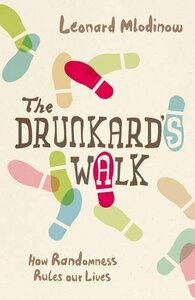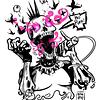Take a photo of a barcode or cover
Effectively intermingles compelling personal portraits of the scientists that studied randomness but also is able to put the probabilistic points across well to a general audience. However, I may not be the best judge of that as I am a statistician. Easy and enjoyable to read without feeling like the material was dumbed down.
informative
reflective
medium-paced
gostei muito do apanhando que o autor faz sobre a história da estatística
Unlike a conversation with a drunkard at a bar, this book taxed my brain. The book also depressed me some. Are our lives nothing but a futile search to find a pattern in a world of randomness?
At least the book finally showed me how you could figure out the demographics of a city of Phoenix (population 3.0 mil+) by just surveying a couple thousand.
Our brains do have limitations and weaknesses which the book points out readily. I do think we live in a world of much more randomness than most of care to admit.
Using two examples from the book, perhaps, Bill Gates and Bruce Willis were lucky in this world of randomness. I believe that luck comes to people who put forth the effort and keep their minds open. We each still have control over that.
Um livro que fala como a aleatoriedade está relacionada nas vidas das pessoas e como isso pode afetar diretamente e indiretamente. Leonard Mlodinow explica tecnicamente os conceitos básicos e avançados sobre o acaso e cita vários exemplos de como isso acontece.
medium-paced
As I was chattering away to my baby in the car to keep him (and me) amused, I said, “Of course, you know there is no actual order to the universe. If it seems like there is, that’s only because of the pattern seeking parts of your brain at work.”
Which was a pretty major bombshell to drop on myself while driving to a baby shower.
This particular baby shower happened to take place at a library I had never been too, and so when the festivities were over, I took an idle tour of the facilities. What should have happened to have been published with a particularly eye-catching spine? The Drunkard's Walk: How Randomness Rules Our Lives. Naturally, I checked it out.
The book goes through an excellent history of humanity’s exploration and discovery of the concepts of probability. For instance, there was a time when all gamblers used nothing but their guts to intuit how to bet. Even the basic idea that rolling a six-sided dice will give you a one in six chance of getting any given number was something nobody thought of for thousands of years.
But when that one dude did . . . lordy, lord. Did he clean up.
The final chapter is a meditation on what all that means. Basically, nothing we accomplish is a result completely of our own abilities or talent. Most people who hit it big (or hit the skids) only do so because of a string of events they had no control over. This is abhorrent to most people because we like to think that success is an indicator of moral quality or superior ability. Therefore, if people are poor or unhappy, that just means that they are inferior people we can rightfully ignore. If social status isn’t connected to inherent worth, then all of a sudden--while we also all become potential candidates for amazing success--we all become candidates for disastrous failures.
Meanwhile, it has usually been the case that, if a person is in trouble through no fault of their own, it is morally mandated that that person receive help. Hence the ability of children to inspire more charity than adults. But if most of the people who are destitute got that way through no fault of their own, suddenly you begin to understand what Jesus meant by everyone being your neighbor. You begin to understand why Jesus told the rich young ruler to sell everything and give to the poor.
This is the most terrifying thing I think an American born and bred on self-sufficiency and bootstrap myths can conceive of. You are a part of everything. You do not, can not, live in isolation. We are all responsible, by the mere act of existing, for what happens to everybody else. We can choose to use this knowledge to skew the odds in order to create a better world, or we can ignore it and leave ourselves in the hands of fate. Fate, who, as you may remember, really doesn’t give a crap about anything. How will you bet?
Which was a pretty major bombshell to drop on myself while driving to a baby shower.
This particular baby shower happened to take place at a library I had never been too, and so when the festivities were over, I took an idle tour of the facilities. What should have happened to have been published with a particularly eye-catching spine? The Drunkard's Walk: How Randomness Rules Our Lives. Naturally, I checked it out.
The book goes through an excellent history of humanity’s exploration and discovery of the concepts of probability. For instance, there was a time when all gamblers used nothing but their guts to intuit how to bet. Even the basic idea that rolling a six-sided dice will give you a one in six chance of getting any given number was something nobody thought of for thousands of years.
But when that one dude did . . . lordy, lord. Did he clean up.
The final chapter is a meditation on what all that means. Basically, nothing we accomplish is a result completely of our own abilities or talent. Most people who hit it big (or hit the skids) only do so because of a string of events they had no control over. This is abhorrent to most people because we like to think that success is an indicator of moral quality or superior ability. Therefore, if people are poor or unhappy, that just means that they are inferior people we can rightfully ignore. If social status isn’t connected to inherent worth, then all of a sudden--while we also all become potential candidates for amazing success--we all become candidates for disastrous failures.
Meanwhile, it has usually been the case that, if a person is in trouble through no fault of their own, it is morally mandated that that person receive help. Hence the ability of children to inspire more charity than adults. But if most of the people who are destitute got that way through no fault of their own, suddenly you begin to understand what Jesus meant by everyone being your neighbor. You begin to understand why Jesus told the rich young ruler to sell everything and give to the poor.
This is the most terrifying thing I think an American born and bred on self-sufficiency and bootstrap myths can conceive of. You are a part of everything. You do not, can not, live in isolation. We are all responsible, by the mere act of existing, for what happens to everybody else. We can choose to use this knowledge to skew the odds in order to create a better world, or we can ignore it and leave ourselves in the hands of fate. Fate, who, as you may remember, really doesn’t give a crap about anything. How will you bet?
This is one of the more convincing non-fiction books I've read lately. Mlodinow does a great job explaining the mathematics behind his assertion that randomness has much more to do with our lives than we're willing to believe. The lesson of the book is the only way to increase the likelihood of success is to increase the number of attempts. Whether you find that to be discouraging or encouraging probably depends on your optimism.
An interesting book on probability theory that puts many of these complex ideas into more digestible anecdotes and explanations. From the titular Drunkard's Walk of randomness to the deceiving reality behind the Monty Hall problem, this is an interesting read that will hopefully get you to read even more books along the same vein.
The book did kind of drag on for longer than I would have liked, and not all of the chapters were quite as exciting. But it definitely did give me a better appreciation for the world of probability.
The book did kind of drag on for longer than I would have liked, and not all of the chapters were quite as exciting. But it definitely did give me a better appreciation for the world of probability.
found this to be a great introduction to the topic of chance. it brought up relevant matters regarding our day to day life in an analytical/scientific manner (and yet understandable thanks to the use of analogies and real life examples).
I was mostly glad by the last parts that really brought up the matter to our lives and how more than what is it that you do or what you are capable of, chance is a big player in the course of the future will be and how, in search of control over our lives, we create mechanisms that separate us from the actual randomness of our lives.
I was mostly glad by the last parts that really brought up the matter to our lives and how more than what is it that you do or what you are capable of, chance is a big player in the course of the future will be and how, in search of control over our lives, we create mechanisms that separate us from the actual randomness of our lives.


